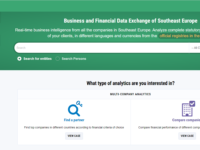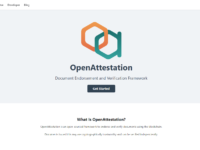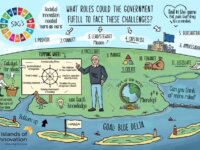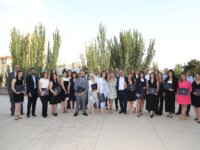The Knowledge Platform with the working title of 'ERA-volution' is a community space for dialogue on current EU initiatives between policy makers and stakeholders in Slovenia in the fields of Higher Education, Research and Innovation. In this way, we aim to strengthen the co-design and joint implementation of policies in these areas, to support cooperation of Slovenian stakeholders in EU initiatives, and effectively promote synergies between the fields.
Innovation Tag: Cross-Border Innovation (Top 37)
Singapore's Government developed OpenAttestation, an open-source framework to support endorsement and verification of documents using the blockchain. With this, an easy and reliable way to issue and validate tamper-proof certificates is readily available to the Government as well as any adopters locally or internationally.
Better Insights into Collective Climate Actions: The currently fragmented, insufficient and incompatible sources building the climate data framework remain a critical threat to a successful outcome of the 2023 Global Stocktake for the Paris Agreement. While we observe an increasing amount of participation, effective ways of connecting, visualizing and analysing actors patterns & impact, within the overall climate initiatives, remain limited.
The Valenzuela City Social Welfare and Development Office (CSWDO) participated in the 13-week accelerator programme. The The accelerator is a 13-week innovation programme. The programme took the staff from CSWDO who needed to support individuals in crisis situations. They addressed the problems and applied innovation methodologies to create solutions that work. The programme targeted root-cause problems, facilitated collaboration, and upskilled participants – driving better outcomes.
Together with partners from 5 other European countries, the Province of Fryslân developed an innovation model (so-called Tipping Approach) to catalyse and stimulate bottom-up innovations and harness ideas from local stakeholders. Complementing this, a governance model is being developed to provide civil servants with tools to implement these innovations in the social process in a simple and user-friendly way.
The Carbon-Free Island JEJU by 2030 (CFI 2030) policy aims to transform Jeju into a carbon-free island by 2030. It is the first project in the world to target an area with a population of over 500,000 and has been ongoing since 2012. Home to the UNESCO-designated Biosphere Reserve (2002), World Natural Heritage Site (2007), and Global Geopark (2010), Jeju strives towards a carbon-neutral future utilizing state-of-art technology including renewable energy, EV, smart grids, and microgrids.
The Government of Armenia has launched “iGorts” - an unprecedented program that invites Diaspora Armenian professionals to work in Armenia's state institutions. Within the framework of the program, Diaspora Armenian professionals are placed in state agencies in need of their expertise and have the opportunity to lend their experience and knowledge toward improving and developing the state institution and its policies and programs.
Digitalization of government often refers an individual project but should include on-going projects. Our city has been building the foundation that allows us to digitalize pubic services simultaneously. Shibuya collects city data and make it open so that innovators could collaborate with us. Secondly we educate our people. Shibuya provides digital devices to children and senior citizens. Thirdly, we let startups to test their product in the city. Finally we will institutionalize the actions.
A problem for companies and owners of companies is that they need to engage with many different authorities to conduct their business. Instead of building solutions in a siloed approach we aim to build into the ecosystem by integrating different actors and enabling the business to control their own data using blockchains and digital wallets. This is both a new approach and use of a combination of new technologies that benefits the companies.
Case Study
BIFIDEX – Official Business and Financial Analytics for the single market in the Western…

Countries in the Western Balkans created digital infrastructure to support transparent business operation and prevent fraud in their Common Regional Market. The official registries from 5 countries in the Western Balkans created a digital platform, connecting all official legal and financial data about companies, connected entities, blocked bank accounts and sanctioned persons, bridging different legislations, languages and currencies. The platform won the 2022 OECD/SIGMA/ReSPA award.




